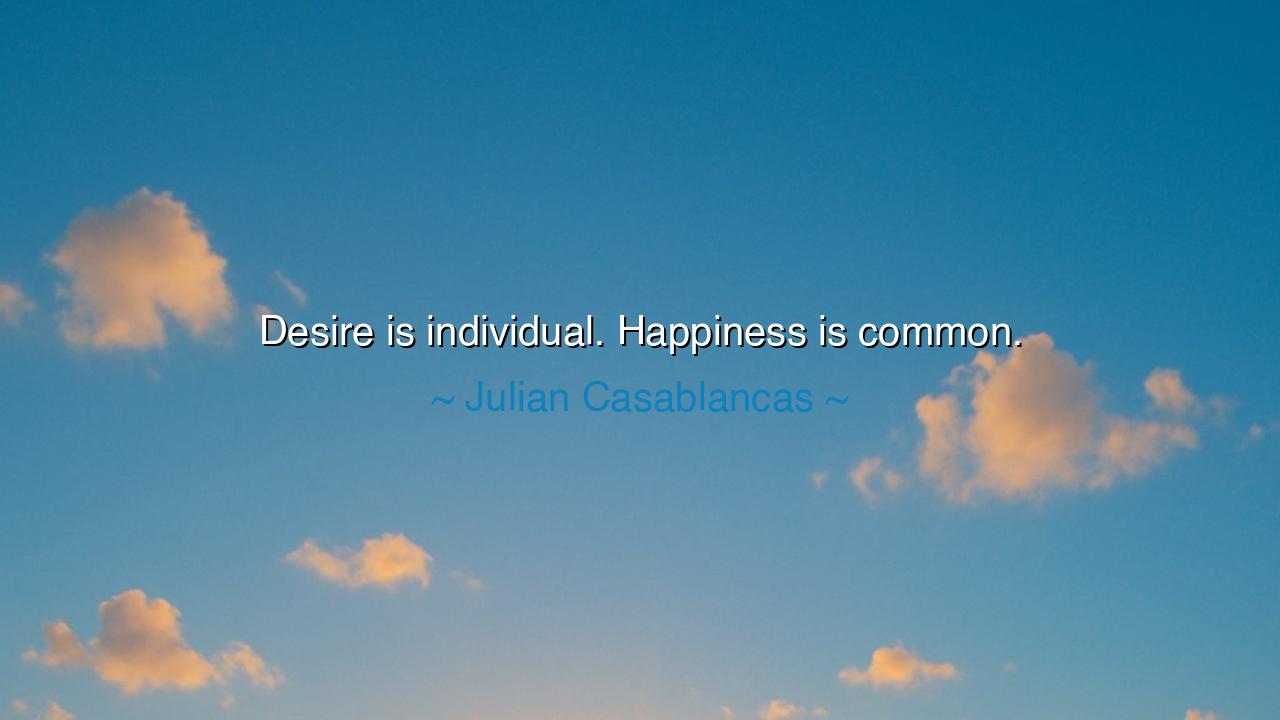
Desire is individual. Happiness is common.






Hear now the thoughtful words of Julian Casablancas, a poet of the modern age and a voice of restless youth, who once said: “Desire is individual. Happiness is common.” Though his tongue was shaped by music and rebellion, his insight speaks like that of the ancients. For in these few words, he captures a truth that has echoed through the centuries — that desire divides, but happiness unites; that the things we crave belong to the self, but the things that make life good belong to all humanity. His words are both a lament and a revelation, a mirror held to the fever of our age and the wisdom that lies beyond it.
When Casablancas spoke these words, he was reflecting on the human condition — how each of us is bound by our private longings, our desires, which rise from the depths of our individuality. One man desires fame, another fortune; one dreams of adventure, another of peace. These desires are like sparks — unique, bright, and fleeting. They move us, but they also separate us. For in the pursuit of what is personal, we often forget what is universal. We chase our own fires, blind to the steady warmth that glows quietly in the hearth of shared happiness.
Desire, said the Buddha long ago, is the root of suffering — not because it is evil, but because it is endless. It is the wind that never rests, always searching for more. Each person’s desire is shaped by their story, their hunger, their wounds. And though desire gives motion to life, it can also lead us astray, making us believe that joy lies only in the next possession, the next victory, the next dream fulfilled. Casablancas, like the sages before him, reminds us that such striving is solitary — that in the kingdom of desire, there is no communion, only competition. It is the realm of “I,” not of “we.”
But happiness, he tells us, is common. It is not hidden in the private vaults of the powerful, nor reserved for the chosen few. It dwells in the simple, in the shared, in the human moments that bind us together. When laughter rings between friends, when music fills a room, when two strangers share a smile — that is happiness. It is not owned; it is experienced together. The hungry man may find joy in bread, but the deeper joy is found in breaking that bread with another. The weary may rest alone, but rest becomes peace when shared beside a fire, beneath a sky full of stars.
Think of Nelson Mandela, who after twenty-seven years in prison emerged not filled with vengeance, but with forgiveness. His desire for personal freedom had long been denied — yet his heart turned toward something greater: the common happiness of his people. His joy was not in triumph over his enemies, but in unity, reconciliation, and the hope that all might walk free. Here lies the wisdom of Casablancas’ words: desire is individual, but happiness is the harmony of many souls breathing as one.
We live in an age that worships individuality — an age of desire multiplied a thousandfold by the screens and noise that surround us. Each person chases their own reflection, mistaking it for fulfillment. But the ancients knew, as Casablancas reminds us, that joy cannot grow in isolation. The tree that stands alone withers in the wind; the forest thrives because its roots intertwine beneath the soil. Happiness, the kind that endures, is not found by clutching what is “mine,” but by rejoicing in what is “ours.”
So, my child, remember this truth: let your desires give you motion, but let your happiness give you meaning. Seek not only what satisfies your own heart, but what uplifts the hearts around you. Share laughter freely; give kindness without measure; build bridges instead of towers. In doing so, you will find that happiness, though common, is also divine — the one treasure that grows greater the more it is given.
Thus, the teaching of Julian Casablancas becomes clear: Desire belongs to the self, but happiness belongs to the world. Desire burns bright, but fades; happiness glows softly, and endures. Choose, then, not the lonely fire of wanting, but the shared light of joy. For when we learn to rejoice in one another’s peace, we will discover that happiness was never lost — it was always within us, waiting to be shared.






AAdministratorAdministrator
Welcome, honored guests. Please leave a comment, we will respond soon